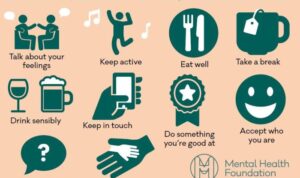Healthy lifestyle tips are like the key to unlocking a world of wellness and vitality – from diet and exercise to mental health and sleep hygiene, this journey is all about embracing the best version of yourself.
General Healthy Lifestyle Tips

To live a healthy lifestyle means taking care of both your body and mind. It involves making choices that benefit your overall well-being and longevity. Maintaining a healthy lifestyle is crucial for reducing the risk of chronic diseases, improving mental health, and enhancing quality of life.
Key Components of a Healthy Lifestyle
- Eat a Balanced Diet: Focus on consuming a variety of fruits, vegetables, whole grains, lean proteins, and healthy fats. Limit processed foods, sugary drinks, and excessive salt intake.
- Stay Active: Aim for at least 150 minutes of moderate aerobic activity or 75 minutes of vigorous activity per week. Include strength training exercises at least twice a week.
- Get Sufficient Sleep: Aim for 7-9 hours of quality sleep each night to allow your body to rest and rejuvenate.
- Stay Hydrated: Drink an adequate amount of water throughout the day to maintain proper bodily functions and prevent dehydration.
- Manage Stress: Find healthy ways to cope with stress such as exercise, meditation, deep breathing, or engaging in hobbies.
- Avoid Harmful Substances: Limit alcohol consumption, avoid tobacco products, and steer clear of illicit drugs.
Diet Tips for a Healthy Lifestyle

To maintain overall health, a balanced diet is crucial. It provides essential nutrients that support our body functions and help prevent diseases. Incorporating nutritious foods and staying hydrated are key components of a healthy diet.
Nutritious Foods to Include in Your Diet, Healthy lifestyle tips
- Eat a variety of fruits and vegetables rich in vitamins, minerals, and antioxidants.
- Incorporate whole grains like quinoa, brown rice, and oats for fiber and sustained energy.
- Include lean sources of protein such as chicken, fish, tofu, and legumes for muscle repair and growth.
- Don’t forget healthy fats like avocados, nuts, and olive oil for heart health and brain function.
Importance of Staying Hydrated
Hydration is essential for overall health as water plays a vital role in various bodily functions. It helps regulate body temperature, aids in digestion, and flushes out toxins. Dehydration can lead to fatigue, headaches, and even more serious health issues.
Exercise and Fitness Tips
Regular physical activity plays a crucial role in maintaining overall well-being. It not only helps in improving physical health but also has a positive impact on mental health.
Benefits of Regular Physical Activity
- Improves cardiovascular health and reduces the risk of heart diseases.
- Helps in managing weight and preventing obesity.
- Strengthens muscles and bones, reducing the risk of osteoporosis.
- Boosts mood and reduces stress levels.
- Improves sleep quality and overall energy levels.
Different Types of Exercises
- Cardiovascular Exercises: Running, cycling, swimming, and dancing are great for improving heart health.
- Strength Training: Weightlifting, resistance band exercises, and bodyweight exercises help in building muscle and increasing metabolism.
- Flexibility Exercises: Yoga, Pilates, and stretching exercises improve flexibility and reduce the risk of injuries.
- High-Intensity Interval Training (HIIT): Combines short bursts of intense exercise with periods of rest, great for burning calories and improving endurance.
Incorporating Exercise into a Busy Schedule
- Set realistic goals and prioritize your workouts.
- Find pockets of time throughout the day to sneak in quick exercises, like taking the stairs instead of the elevator or doing squats during a work break.
- Combine exercise with other activities, like walking or cycling to work, or doing yoga while watching TV.
- Make use of fitness apps or online workout videos for guided sessions that fit your schedule.
Mental Health and Stress Management: Healthy Lifestyle Tips
Mental health is an integral part of a healthy lifestyle, as it affects how we think, feel, and act. Stress, if not managed effectively, can have detrimental effects on mental well-being. Self-care practices play a crucial role in maintaining good mental health.
Connection between Mental Health and a Healthy Lifestyle
Our mental health is closely linked to our overall well-being. When we take care of our mental health, we are better equipped to handle the challenges that come with maintaining a healthy lifestyle. Poor mental health can impact our motivation, energy levels, and ability to make positive choices.
Strategies for Managing Stress Effectively
Managing stress is essential for mental well-being. Some effective strategies include:
- Practicing mindfulness and meditation
- Engaging in regular physical activity
- Setting boundaries and learning to say no
- Seeking support from friends, family, or a therapist
Importance of Self-Care Practices
Self-care practices are crucial for maintaining good mental health. Taking time for yourself and engaging in activities that bring you joy and relaxation can help reduce stress levels and improve overall well-being. Remember, self-care is not selfish; it is necessary for a healthy mind and body.
Sleep Hygiene Tips
Quality sleep is essential for maintaining good health as it allows our bodies to rest, repair, and recharge. Poor sleep hygiene can lead to a variety of health issues, including weakened immune system, impaired cognitive function, and increased risk of chronic diseases.
Importance of Quality Sleep
- Aim for 7-9 hours of sleep each night to allow your body to go through all the necessary sleep cycles.
- Avoid caffeine, nicotine, and alcohol close to bedtime as they can disrupt sleep patterns.
- Create a relaxing bedtime routine to signal to your body that it’s time to wind down.
Tips for Improving Sleep Quality and Quantity
- Keep your bedroom cool, dark, and quiet to create an optimal sleep environment.
- Avoid screens (phones, tablets, computers) at least an hour before bedtime as the blue light can interfere with melatonin production.
- Establish a consistent sleep schedule by going to bed and waking up at the same time every day, even on weekends.
Impact of Sleep on Overall Well-being and Productivity
- Quality sleep has a direct impact on mood, energy levels, and cognitive function throughout the day.
- Poor sleep can lead to increased stress, irritability, and difficulty concentrating on tasks.
- By prioritizing sleep and practicing good sleep hygiene, you can improve your overall well-being and productivity levels.



